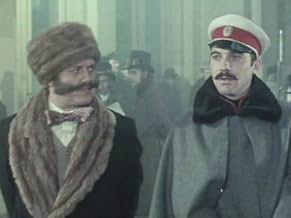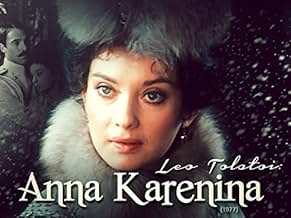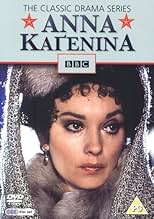Anna Karenina es la joven esposa de un marido mayor que ella. Tiene una aventura con el apuesto conde Vronsky. Al seguir sus deseos, Anna se complica la vida.Anna Karenina es la joven esposa de un marido mayor que ella. Tiene una aventura con el apuesto conde Vronsky. Al seguir sus deseos, Anna se complica la vida.Anna Karenina es la joven esposa de un marido mayor que ella. Tiene una aventura con el apuesto conde Vronsky. Al seguir sus deseos, Anna se complica la vida.
- Nominado a 2 premios Primetime Emmy
- 5 nominaciones en total
Explorar episodios
Opiniones destacadas
Both of the leads, Nicola Paget and Stuart
Wilson, are nearly perfect in their roles. Wilson especially is a fully developed character and one a woman might fling away her life for. Nicola Paget is beautiful, high strung, and portrays Anna as a woman on the edge...more or less forced into an early marriage with a stuffy, pompous and very dull statesman. Only the love for her young son prevents her from divorcing at any cost. Meanwhile the love of her life Vronsky suffers for her as she drives herself to distraction. Wilson is really excellent as Vronsky and I also loved him as Fernando Lopez in The Pallisers. He is an underrated dramatic actor. The supporting characters are mostly well-cast and well-acted. I have watched many versions of this story and this version ranks at the top for me.
This version of 'Anna Karenina' by Tolstoy presents the story in ten parts of around 50 minutes each. Starring Nicola Pagett, best known as Elizabeth Bellamy in 'Upstairs, Downstairs', as Anna; with Stuart Wilson as Vronsky and Eric Porter as Karenin.
This is a leisurely version, with time to develop the minor characters and subplots, while keeping true to the book in the story of Anna's affair with Count Vronsky, and its tragic conclusion. It starts with the infidelity of her brother and in doing so, shows the difference between men and women where divorce and adultery are concerned.
As Anna, Pagett is excellent, veering from thoughtless frivolity to total despair; while Eric Porter is perfect as Karenin, strong, tormented, and complicated. Stuart Wilson is charming as Vronsky, looks the part and is an appealing character. In support the rest of the cast are excellent too, especially Sheila Gish as Betsy and Mary Morris as Countess Vronsky.
This mini series is well worth your time and doesn't have a dated feel at all - the space given to the story means this version has more weight than those with Garbo or Vivien Leigh.
This is a leisurely version, with time to develop the minor characters and subplots, while keeping true to the book in the story of Anna's affair with Count Vronsky, and its tragic conclusion. It starts with the infidelity of her brother and in doing so, shows the difference between men and women where divorce and adultery are concerned.
As Anna, Pagett is excellent, veering from thoughtless frivolity to total despair; while Eric Porter is perfect as Karenin, strong, tormented, and complicated. Stuart Wilson is charming as Vronsky, looks the part and is an appealing character. In support the rest of the cast are excellent too, especially Sheila Gish as Betsy and Mary Morris as Countess Vronsky.
This mini series is well worth your time and doesn't have a dated feel at all - the space given to the story means this version has more weight than those with Garbo or Vivien Leigh.
The limitations of a late 70's BBC budget are everywhere apparent in this nonetheless absolutely captivating production. One only wishes a proper film could have been made with this same cast and script, but of course that would have probably drained the production of what makes it so spectacular - its sheer expansiveness. In its nearly 10-hour runtime, it covers practically all of the novel's myriad episodes, and the dizzying complexities of its timeless characters - Anna's at once near schizophrenia and almost magical charm and poise, Vronsky's extreme selfishness and rakish abandon, yet unquestionable honor and devotion, and Karenin's cruel, detached vindictiveness tempered by his capacity for forgiveness and tenderness. The script is so heavily in the spirit of Tolstoy's writings that quotations from the original novel do not stick out like a sore thumb, as they do in Tom Stoppard's shockingly amateurish script for the Keira Knightley adaptation, but are rather an organic fabric of this labyrinthine and captivating piece. Perhaps hindsight drives this perception given Ms. Pagett's unfortunate mental breakdown subsequent to this production, but she is so effortlessly a living, breathing, enchanting creature suffering from truly intractable emotional and existential distress that it makes the knowledge of her end, which rather intentionally pervades the novel even without its cultural resonance, lend an intense poignance to the film. She is also every bit as beautiful as Anna should be. Supporting characters, from Oblonsky to Betsy (in particular the flippant Countess, whose true, though tested, devotion to Anna is richly filled in here) are handled spectacularly well. But the production in many ways belongs to Stuart Wilson's Vronsky, who manages to convey precisely what makes Vronsky uniquely appealing to a woman of depth - he is a melancholic, inspired, fiery, Byronic hero, and not just a preening pretty face with all of his hair (Aaron Taylor-Johnson, I sadly look at you). Those who were impatient with the Levin twin-plot in the novel will be distressed to see it nearly intact in this version, but Levin is refreshingly well-played and spirited, so that his scenes have a life to them typically denied the almost perfunctory inclusion of the character in most adaptations that do him the service of not cutting him. Kitty is also incredibly beautiful, age appropriate, and charming, so her scenes, while never quite living up to Anna's, prove a welcome distraction.
I have to admit that I saw this series only once (in 1978), and my memory of it has faded somewhat. Nevertheless, I still vividly recall its vibrant reproduction of Tolstoy's masterpiece, its authentic characterizations, and its remarkable set pieces, especially given the fact that this was a television production.
Standouts include Nicola Pagett's complicated portrayal of Anna, and Robert Swann as the ambivalent Levin. The intoxicating scene of Levin and his peasants bringing in the harvest, and Anna's tragic demise are worth viewing again.
Hope the powers that be resurrect this one in the near future!
Standouts include Nicola Pagett's complicated portrayal of Anna, and Robert Swann as the ambivalent Levin. The intoxicating scene of Levin and his peasants bringing in the harvest, and Anna's tragic demise are worth viewing again.
Hope the powers that be resurrect this one in the near future!
10MVKSF
I have a poor VHS copy of the series from when it was shown on PBS in 1984. I have searched for years to locate a clean copy. It is worth viewing over and over again--the acting is tremendous.
The costuming and sets are great, and the series is true to the text and atmosphere of the original novel.
I recommend it to anyone, but for some reason it has not been issued or reissued in the market. BBC has reissued most of its major series in VHS or DVD. I hope that this will be the case for this great series.
This is a timeless story that is absolutely fundamental to an understanding or consideration of what it is like to live our lives out even with all the pitfalls and joys.
The costuming and sets are great, and the series is true to the text and atmosphere of the original novel.
I recommend it to anyone, but for some reason it has not been issued or reissued in the market. BBC has reissued most of its major series in VHS or DVD. I hope that this will be the case for this great series.
This is a timeless story that is absolutely fundamental to an understanding or consideration of what it is like to live our lives out even with all the pitfalls and joys.
¿Sabías que…?
- TriviaAnna Karenina is a novel by the Russian author Lev Tolstoy, first published in book form in 1878. Considered to be one of the greatest works of literature ever written, Tolstoy himself called it his first true novel. It was initially released in serial installments from 1875 to 1877, all but the last part appearing in the periodical The Russian Messenger. When William Faulkner was asked to list what he thought were the three greatest novels, he replied: "Anna Karenina, Anna Karenina, and Anna Karenina."
- ConexionesFeatured in The 30th Annual Primetime Emmy Awards (1978)
Selecciones populares
Inicia sesión para calificar y agrega a la lista de videos para obtener recomendaciones personalizadas
- How many seasons does Anna Karenina have?Con tecnología de Alexa
Detalles
- Fecha de lanzamiento
- País de origen
- Sitio oficial
- Idioma
- También se conoce como
- Ana Karenina
- Locaciones de filmación
- Productora
- Ver más créditos de la compañía en IMDbPro
Contribuir a esta página
Sugiere una edición o agrega el contenido que falta































